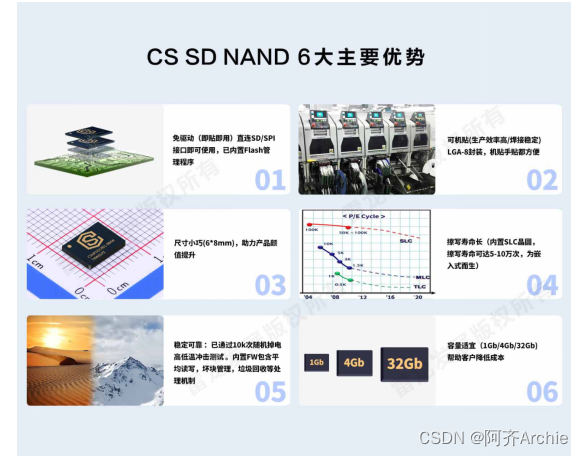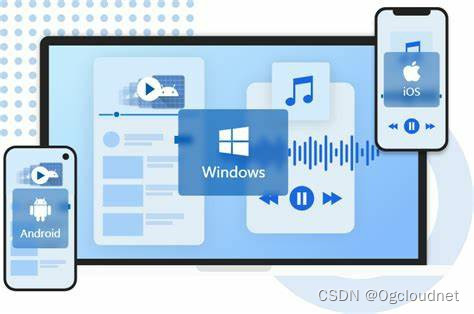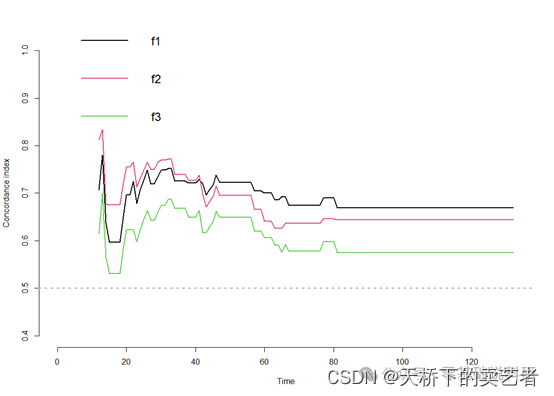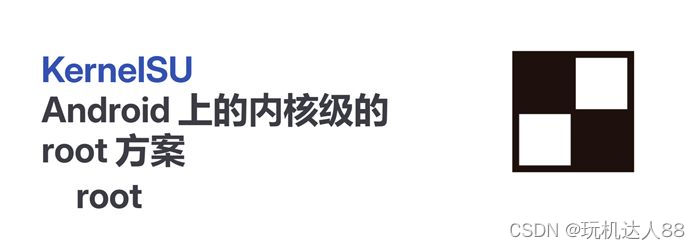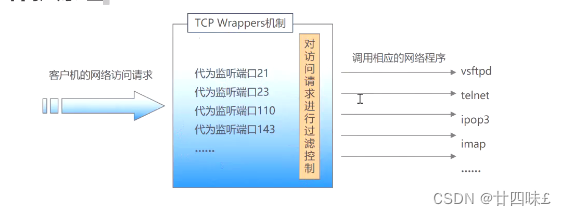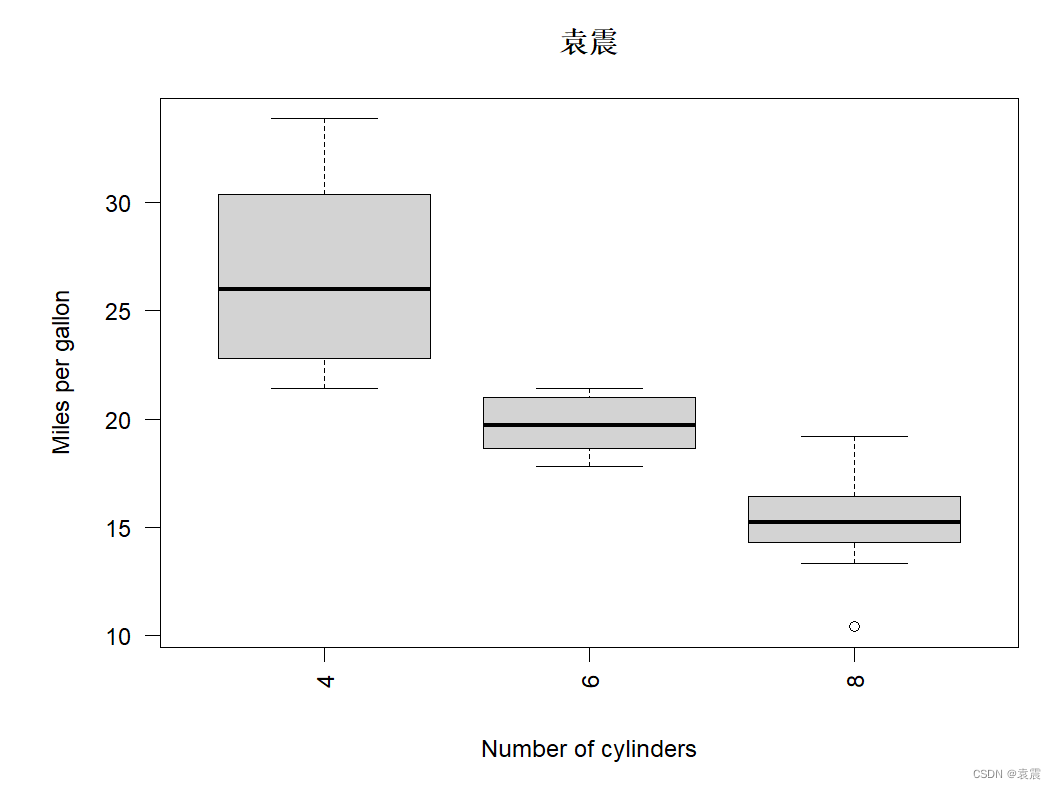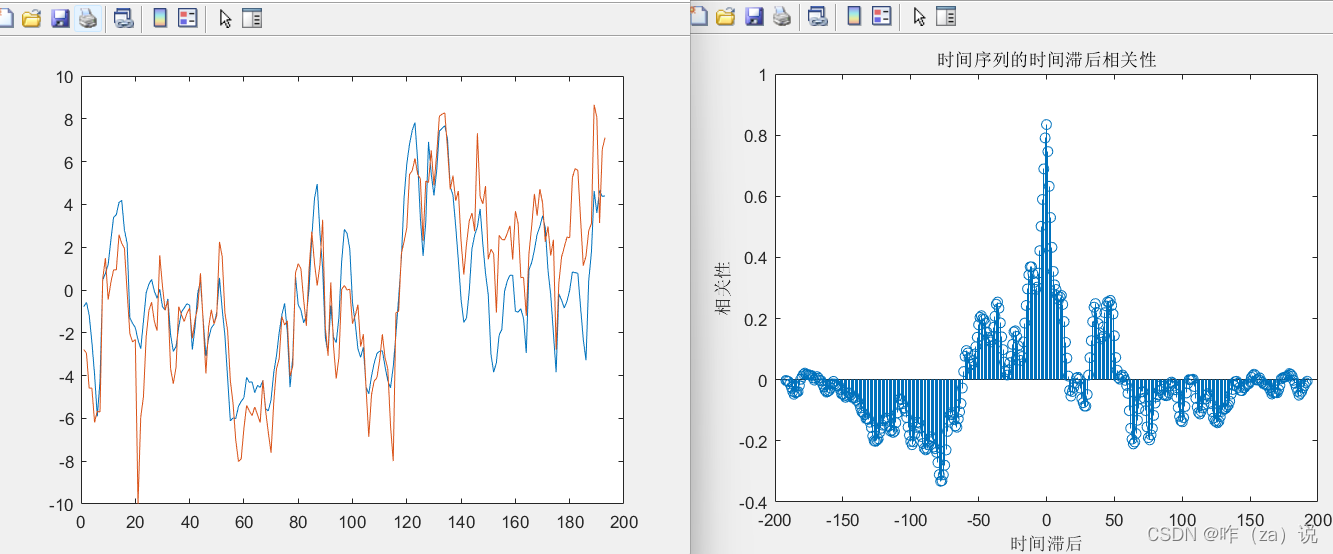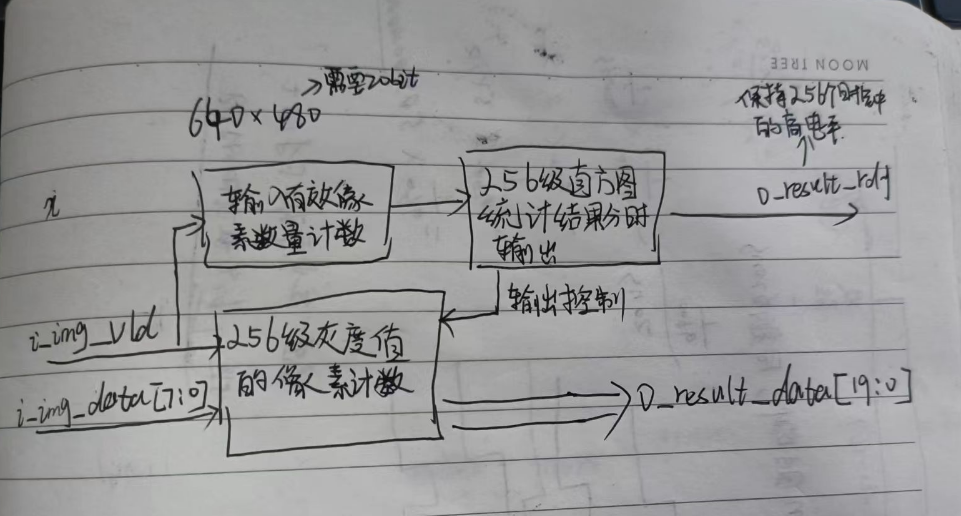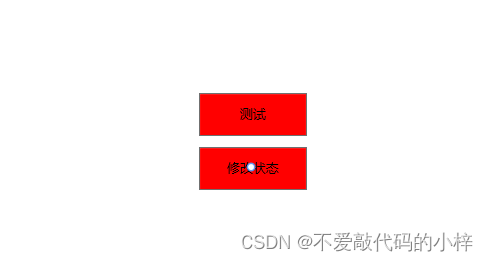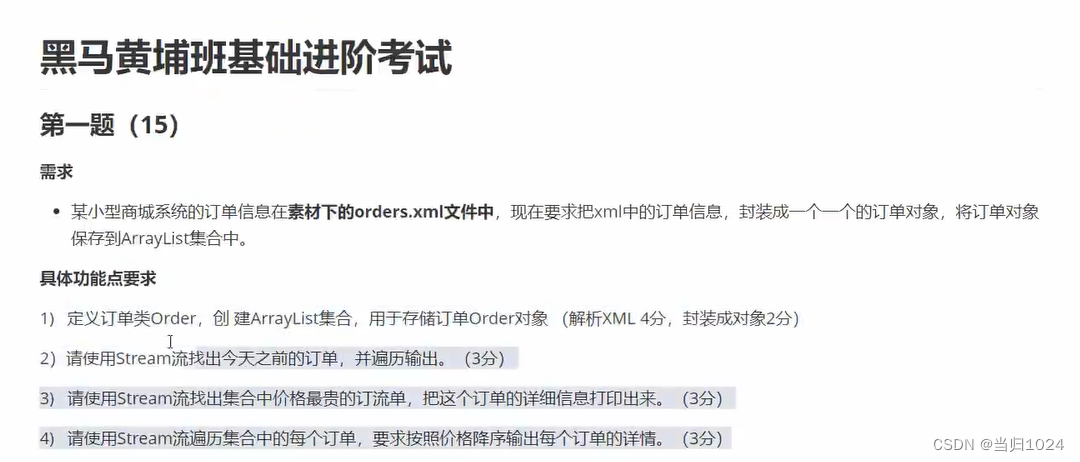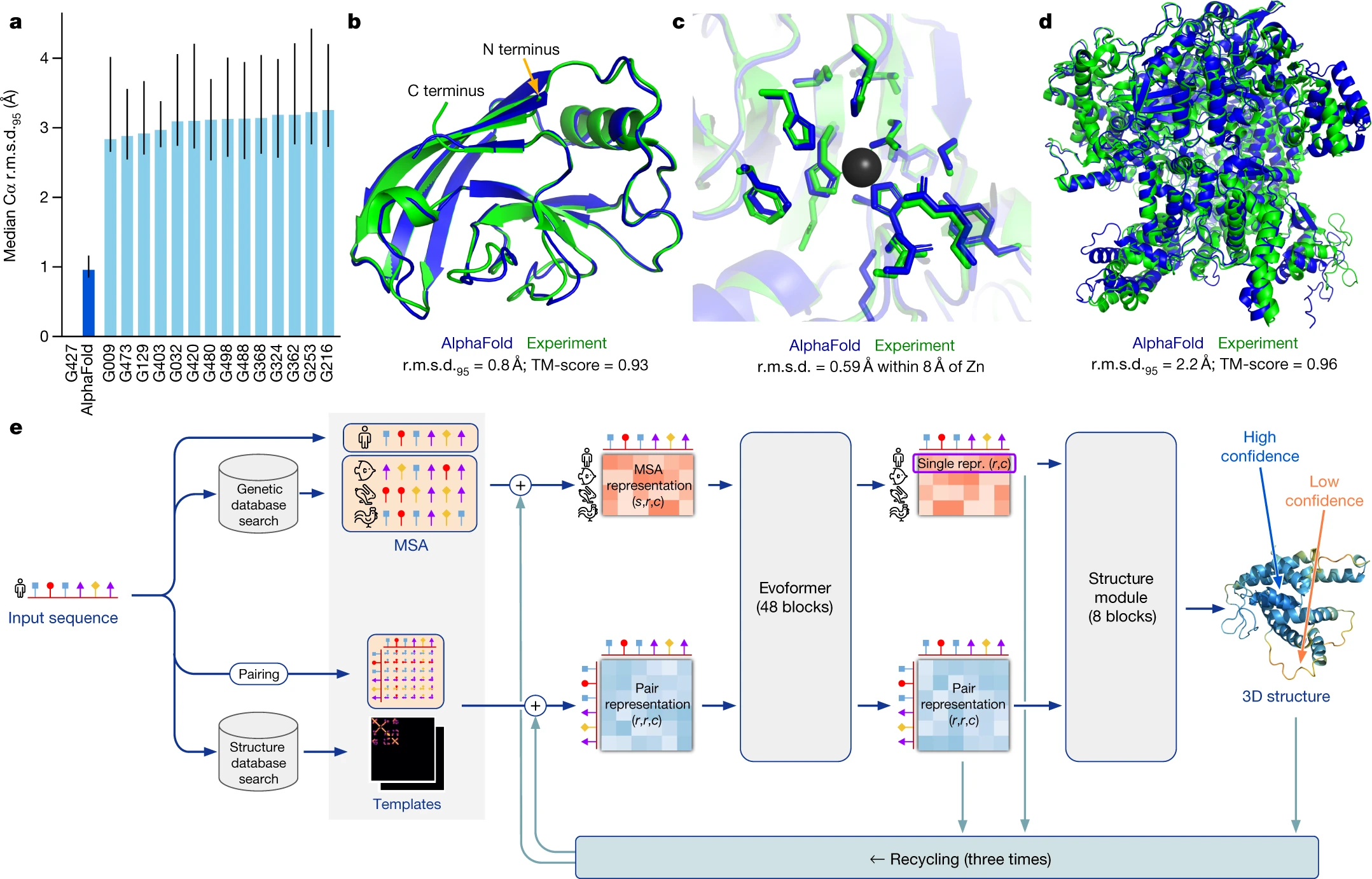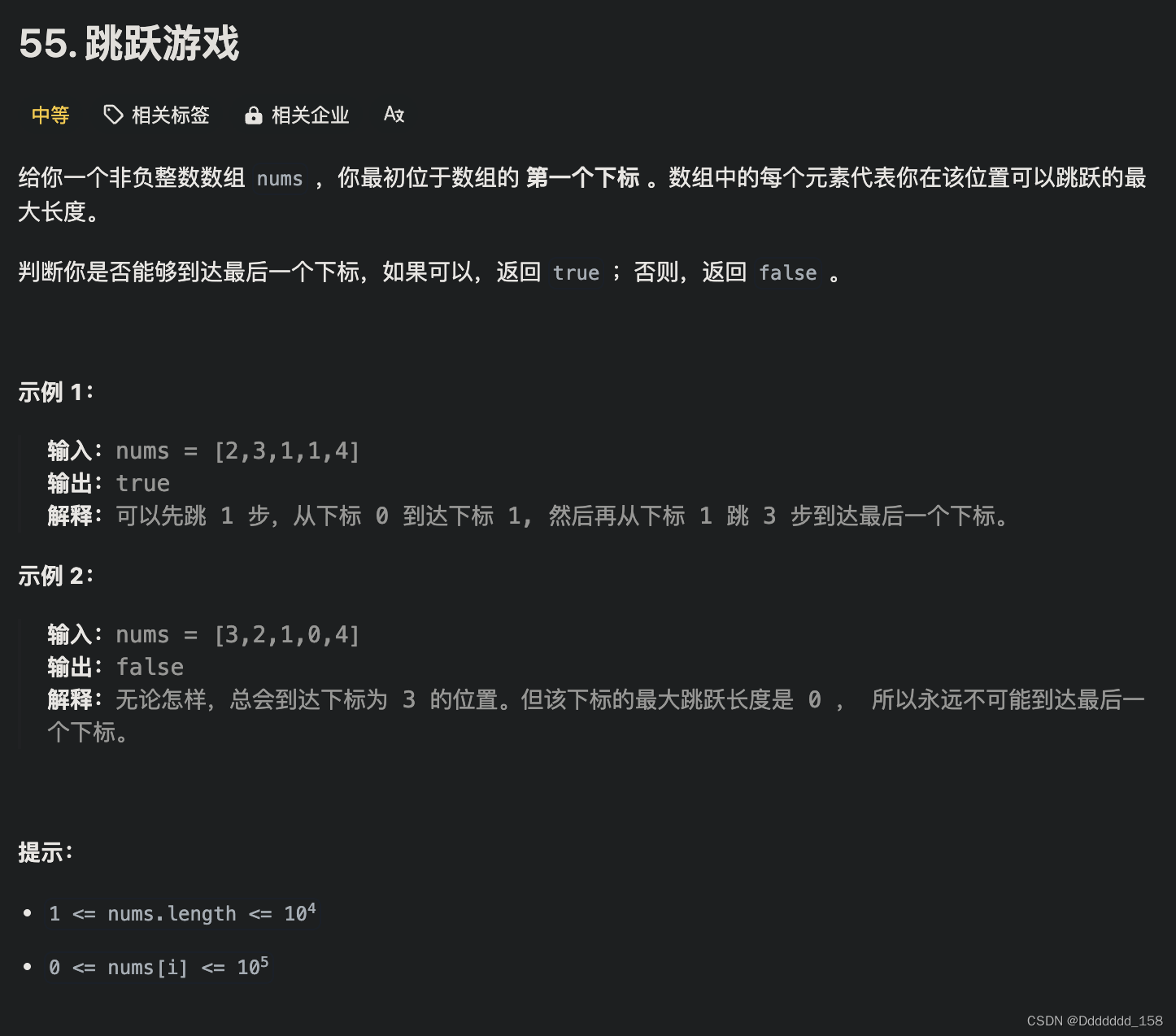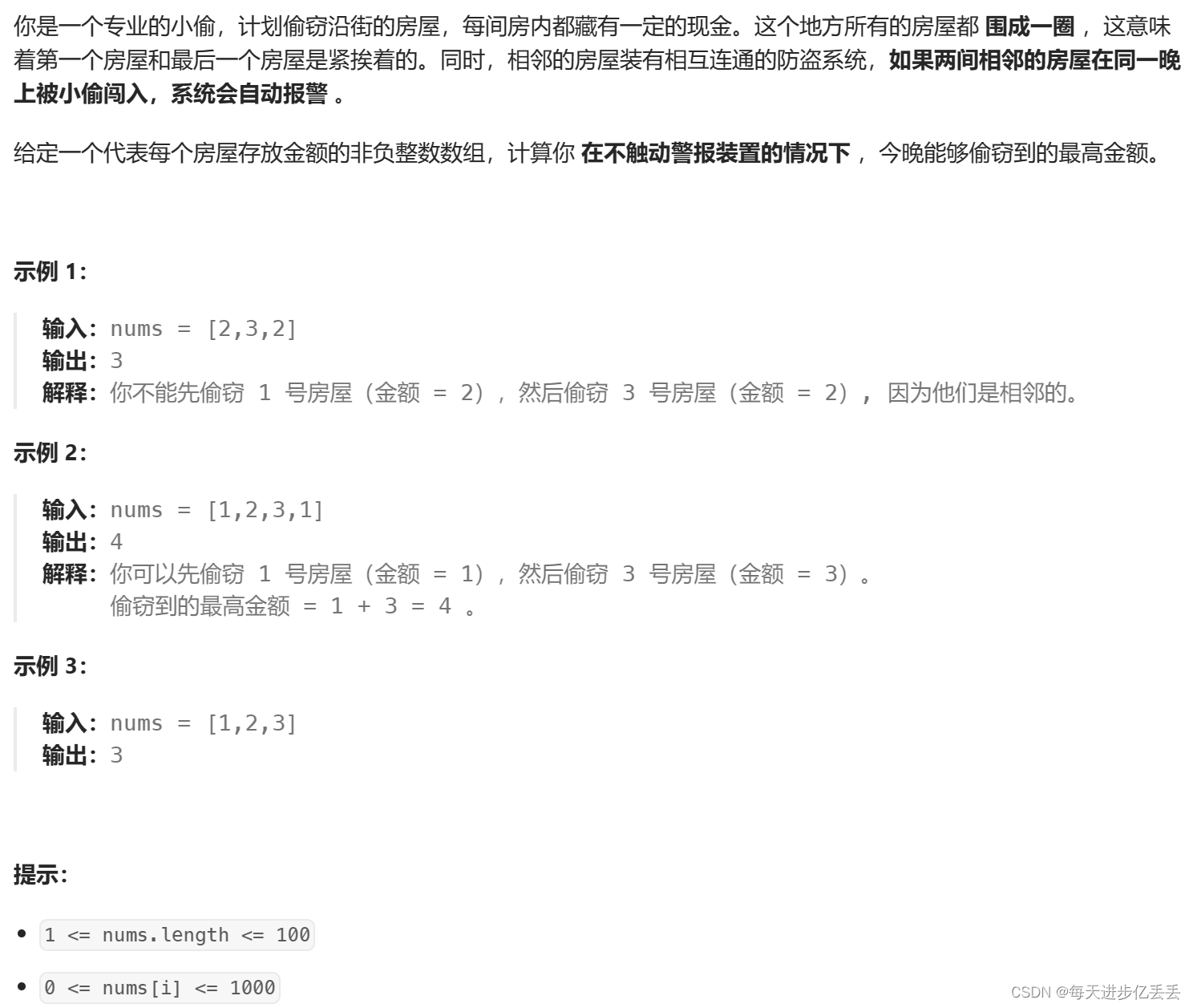目录
上传到指定路径
一、代码层级结构
二、文件上传接口
三、使用postman进行测试;
MultipartFile接收前端传递的文件:127.0.0.1:8082/path/uploadFile
part接收前端传递的文件:127.0.0.1:8082/path/uploadFileByRequest
接收前端传递binary 类型:127.0.0.1:8082/path/upload2
四、springboot 配置
五、文件下载接口
六、使用postman进行测试
上传至数据库
一、代码层级结构
二、文件上传接口
三、文件下载接口
四、使用postman进行测试
上传至Minio
一、代码层级结构
二、文件上传/下载接口
MinioUtils
三、使用postman进行测试
业务分析:实际开发过程中,我们经常对文件的上传和下载的功能实现,所以这也是一个程序员应该掌握的基本开发能力。所以下面我给大家分享一下文件上传和下载的三种方式,分别将文件上传到指定路径下/本地数据库/minio当中。
所有代码都以上传至压缩包资源,可以自行免费进行下载测试;
上传到指定路径
一、代码层级结构
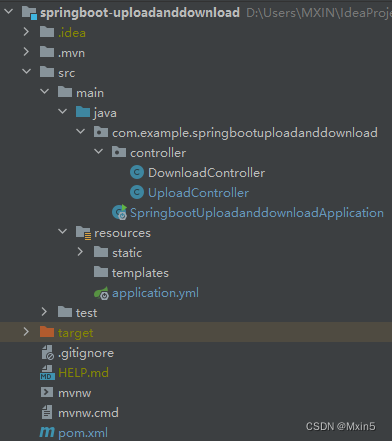
二、文件上传接口
/**
* 上传到指定路径下
*/
@RestController
@Slf4j
@RequestMapping("/path")
public class UploadController {
@Autowired
private ResourceLoader resourceLoader;
private BufferedOutputStream bufferedOutputStream = null;
/**
* form-data 类型
* form-data 类型即常用的表单提交
* 两种处理参数的方式
* <p>
* MultipartFile 类接受前台传过来的文件
* part 接收字节流
*/
@PostMapping("/uploadFile")
public String uploadFile(@RequestParam("name") String name, @RequestPart("file1") MultipartFile file1, @RequestPart("file2") MultipartFile[] file2) throws IOException, ServletException {
// 获取项目部署路径
/* String appPath = request.getServletContext().getRealPath("/");
// 构建上传文件的目录路径
String path = appPath + "static/upload/";*/
//绝对路劲
// String path = "D:\\Users\\MXIN\\IdeaProjects\\springboot-uploadanddownload\\src\\main\\resources\\static\\";
//相对路径
String path = "src/main/resources/static/";
//前端传递多个file(只对file2进行处理)
for (MultipartFile multipartFile : file2) {
// 使用 MultipartFile 字节流保存文件
fileUtil(multipartFile, String.valueOf(path));
}
fileUtil(file1, String.valueOf(path));
return "success";
}
/**
* part 接收字节流
*/
@PostMapping("/uploadFileByRequest")
public String uploadFileByRequest(HttpServletRequest request) throws IOException, ServletException {
// 获取项目部署路径
/* String appPath = request.getServletContext().getRealPath("/");
// 构建上传文件的目录路径
String path = appPath + "static/upload/";*/
//绝对路劲
String path = "D:\\Users\\MXIN\\IdeaProjects\\springboot-uploadanddownload\\src\\main\\resources\\static\\";
// 使用 Part 接收文件字节流
// Part file1 = request.getPart("file1");
// file1.write(path + file1.getSubmittedFileName());
// request.getParts() 获取的是全部参数(name,age,file1,file2),包括文件参数和非文件参数
for (Part part : request.getParts()) {
// 获取文件类型
String contentType = part.getContentType();
// 获取文件大小
long size = part.getSize();
// 获取文件名
String submittedFileName = part.getSubmittedFileName();
if (part.getContentType() != null) {
//如果是文件会进行写入
part.write(path + part.getSubmittedFileName());
} else {
// 如果是参数会获取参数(根据实际需求对参数进行处理)
// 获取参数名
String name1 = part.getName();
}
}
return "success";
}
public String fileUtil(MultipartFile file, String path) {
if (!file.isEmpty()) {
try {
byte[] bytes = file.getBytes();
bufferedOutputStream = new BufferedOutputStream(new FileOutputStream(
new File(path + file.getOriginalFilename())));
bufferedOutputStream.write(bytes);
bufferedOutputStream.close();
return file.getOriginalFilename() + "上传成功";
} catch (Exception e) {
return file.getOriginalFilename() + "上传失败,错误信息为:" + e;
}
} else {
return "上传得文件为空";
}
}
}
三、使用postman进行测试;
MultipartFile接收前端传递的文件:127.0.0.1:8082/path/uploadFile
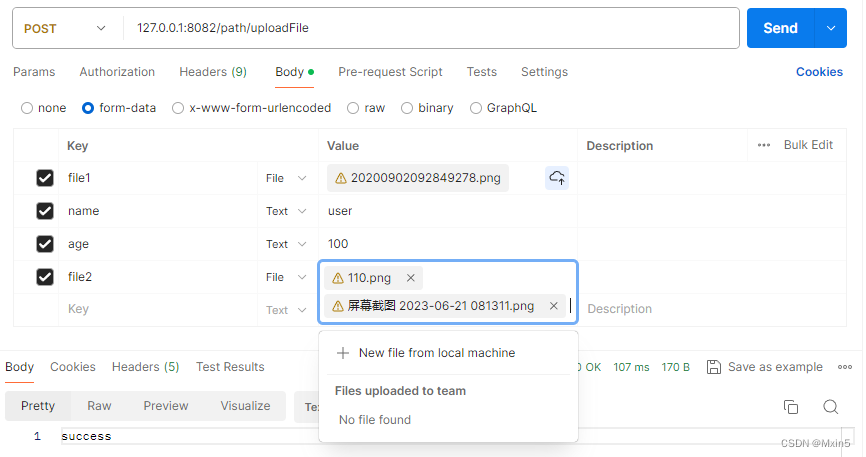
测试结果
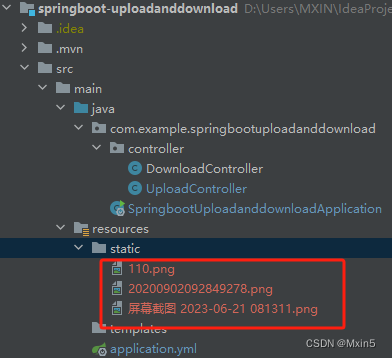
part接收前端传递的文件:127.0.0.1:8082/path/uploadFileByRequest
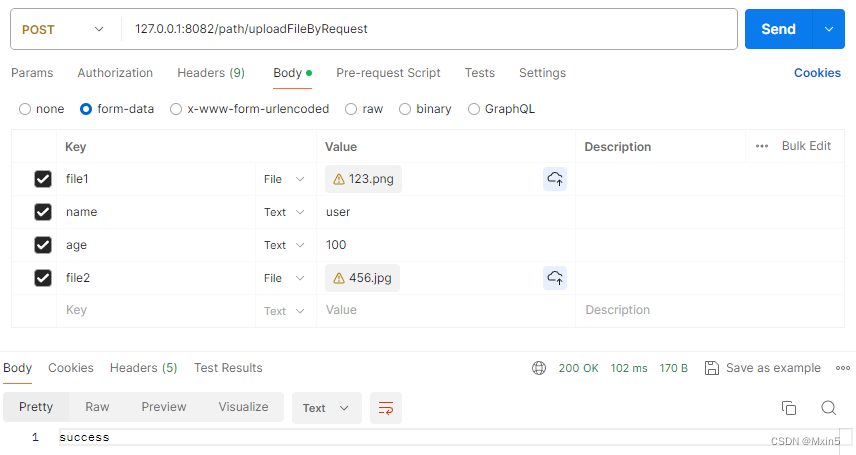
测试结果
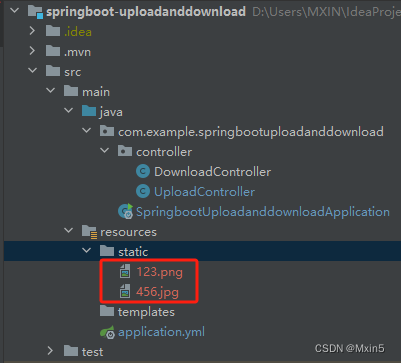
四、上传文件大小设置
由于springboot默认上传文件大小为1M,单个请求最大为10M,当文件超过1M会报错。所以可以通过配置文件限制文件上传大小。
上传大于1M报错信息为:
![]()
Resolved [org.springframework.web.multipart.MaxUploadSizeExceededException: Maximum upload size exceeded]所以修改配置文件(根据自己实际开发需求进行修改):
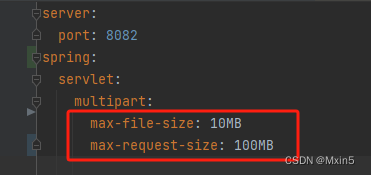
上述简单的介绍了文件上传到指定路径下的方法,下面来简单介绍一下文件下载是如何实现的。
五、文件下载接口
/**
* 下载指定路径下的文件
* */
@RestController
@Slf4j
@RequestMapping("/path")
public class DownloadController {
/**
* 文件下载 isOnline默认为false
*/
@GetMapping("/download")
public void download(String fileName, HttpServletResponse response, boolean isOnLine) throws IOException {
// 路径可以指定当前项目相对路径
File file = new File("D:\\Users\\Mixi\\IdeaProjects\\springboot-uploadanddownload\\src\\main\\resources\\static\\" + fileName);
if (file.exists()) {
FileInputStream fileInputStream = new FileInputStream(file);
ServletOutputStream outputStream = response.getOutputStream();
// 获取文件扩展名
String extension = fileName.substring(fileName.lastIndexOf(".") + 1);
if (!isOnLine) {
// 根据文件扩展名设置Content-Type
String contentType = getContentType(extension);
response.setContentType(contentType);
// 如果文件名为中文需要设置编码
response.setHeader("Content-Disposition", "attachment;fileName=" + URLEncoder.encode(fileName, "utf8"));
// 返回前端文件名需要添加
response.setHeader("Access-Control-Expose-Headers", "Content-Disposition");
}
byte[] bytes = new byte[1024];
int len;
while ((len = fileInputStream.read(bytes)) != -1) {
outputStream.write(bytes, 0, len);
}
}
}
// 根据文件扩展名获取Content-Type
private String getContentType(String extension) {
if ("jpg".equalsIgnoreCase(extension) || "jpeg".equalsIgnoreCase(extension)) {
return "image/jpeg";
} else if ("png".equalsIgnoreCase(extension)) {
return "image/png";
} else if ("gif".equalsIgnoreCase(extension)) {
return "image/gif";
} else if ("txt".equalsIgnoreCase(extension)) {
return "text/plain";
} else if ("pdf".equalsIgnoreCase(extension)) {
return "application/pdf";
} else if ("doc".equalsIgnoreCase(extension) || "docx".equalsIgnoreCase(extension)) {
return "application/msword";
} else if ("xls".equalsIgnoreCase(extension) || "xlsx".equalsIgnoreCase(extension)) {
return "application/vnd.ms-excel";
} else if ("ppt".equalsIgnoreCase(extension) || "pptx".equalsIgnoreCase(extension)) {
return "application/vnd.ms-powerpoint";
} else if ("zip".equalsIgnoreCase(extension)) {
return "application/zip";
} else if ("tar".equalsIgnoreCase(extension)) {
return "application/x-tar";
} else if ("rar".equalsIgnoreCase(extension)) {
return "application/x-rar-compressed";
} else if ("gz".equalsIgnoreCase(extension)) {
return "application/gzip";
} else {
return "application/octet-stream";
}
}
}
六、使用postman进行测试
isOnlie为true和false决定了是否在浏览器上在线查看。
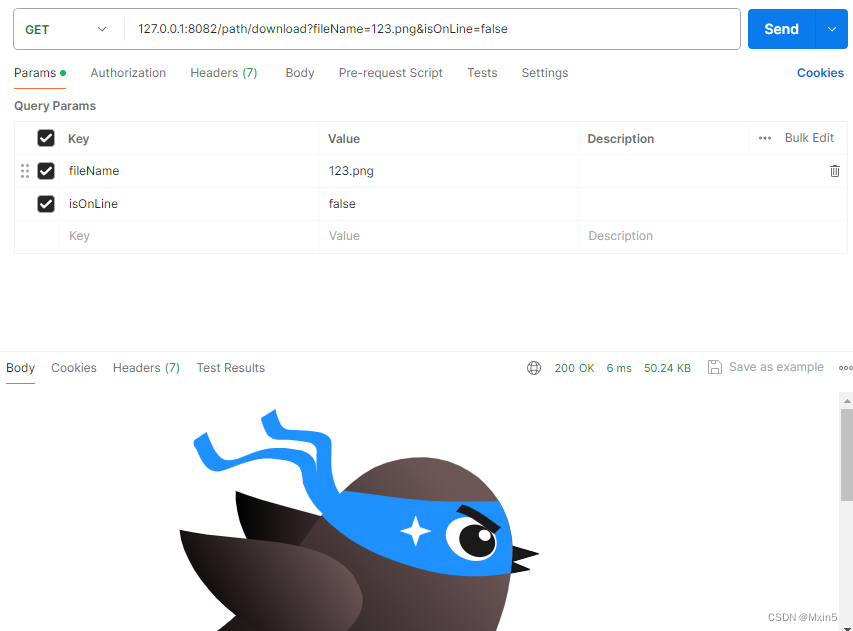
上传至数据库
这种业务需求就是用于项目开发过程中,文件上传下载的功能用的很少,避免搭建部署文件存储的服务器,简化了部署和管理,节约成本资源。
一、代码层级结构
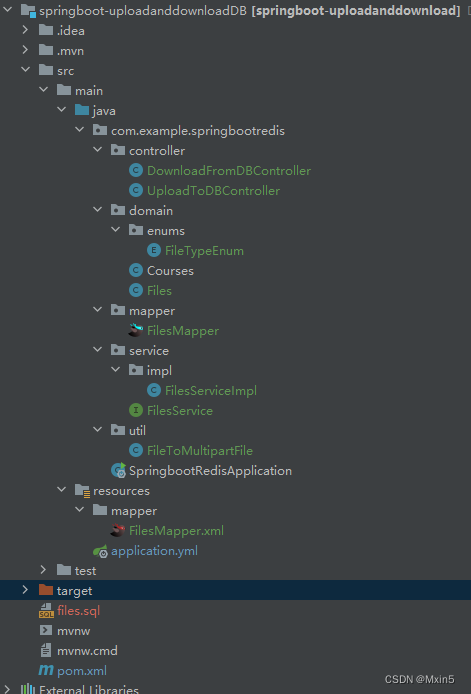
二、文件上传接口
UploadToDBController:
/**
* 上传到数据库
* */
@RestController
@Slf4j
@RequestMapping("/db")
public class UploadToDBController {
@Autowired
private FilesService filesService;
@PostMapping("/uploadFile")
public Files inputFile(@RequestParam("file") MultipartFile file) {
Files files = new Files();
if (null != file) {
String name = file.getOriginalFilename();
byte[] bytes;
try {
bytes = file.getBytes();
} catch (IOException e) {
throw new RuntimeException(e);
}
files.setName(name);
files.setFile(bytes);
filesService.save(files);
}
return files;
}
}FilesServiceImpl:
@Override
public void save(Files files) {
filesMapper.insert(files);
}简单代码的增删改查我就不写了哈。
三、文件下载接口
DownloadFromDBController:
/**
* 从数据库下载
*/
@RestController
@Slf4j
@RequestMapping("/db")
public class DownloadFromDBController {
@Autowired
private FilesService filesService;
@GetMapping("/download/{id}")
public void download(HttpServletResponse response, @PathVariable("id") Integer id) {
filesService.download(response,id);
}
}FilesServiceImpl:
@Override
public HttpServletResponse download(HttpServletResponse response, Integer id) {
try {
byte[] buf;
Files byId = filesMapper.selectById(id);
if (byId == null) {
return response;
}
buf = byId.getFile();
String suffix = FileToMultipartFile.getSuffix(byId.getName());
String contentType = "";
switch (Objects.requireNonNull(FileTypeEnum.getEnum(suffix))) {
case DOC:
contentType = "application/msword";
break;
case DOCX:
contentType = "application/vnd.openxmlformats-officedocument.wordprocessingml.document";
break;
case PDF:
contentType = "application/powerpoint";
break;
case JPE:
case JPG:
case JPEG:
contentType = "image/jpeg";
break;
case PNG:
contentType = "image/png";
break;
case ZIP:
contentType = "application/zip";
break;
case TAR:
contentType = "application/x-tar";
break;
case GZ:
contentType = "application/x-gzip";
break;
case XLS:
contentType = "application/vnd.ms-excel";
break;
case XLSX:
contentType = "application/vnd.openxmlformats-officedocument.spreadsheetml.sheet";
break;
case PPT:
contentType = "application/vnd.ms-powerpoint";
break;
case PPTX:
contentType = "application/vnd.openxmlformats-officedocument.presentationml.presentation";
break;
}
// 清空
response.reset();
String encodedFileName = URLEncoder.encode(byId.getName().replaceAll(" ", "+"), "UTF-8");
// 设置header
response.addHeader("Content-Disposition", "attachment;filename=" + encodedFileName);
// response.addHeader("Content-Length", "" + byId.getFileNo());
response.setCharacterEncoding("UTF-8");
response.setContentType(contentType);
response.getOutputStream().write(buf);
// 强制输出,不然会留在内存里丢失掉
response.getOutputStream().flush();
return response;
} catch (Exception e) {
throw new RuntimeException(e);
}
}四、使用postman进行测试
文件上传:
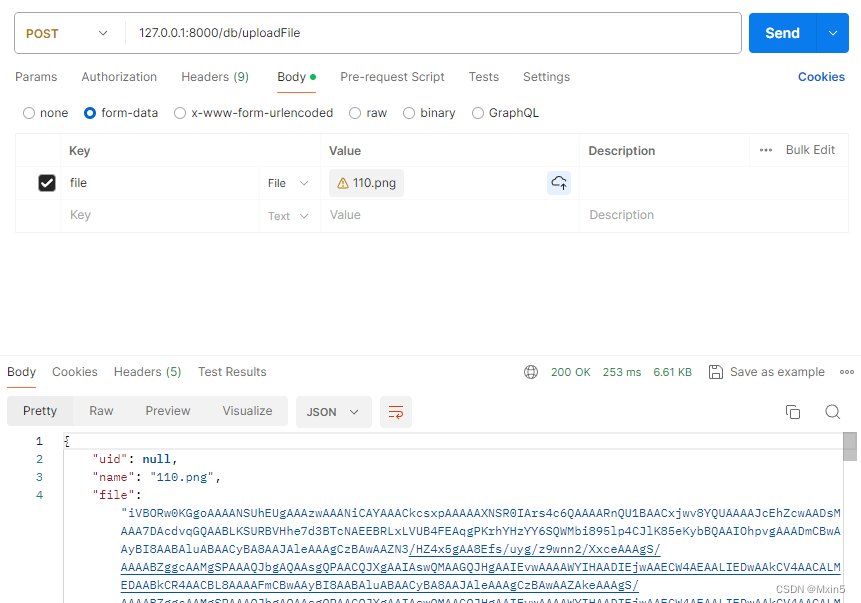
测试结果数据库:
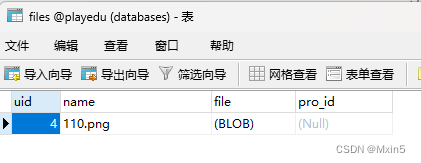
文件下载:
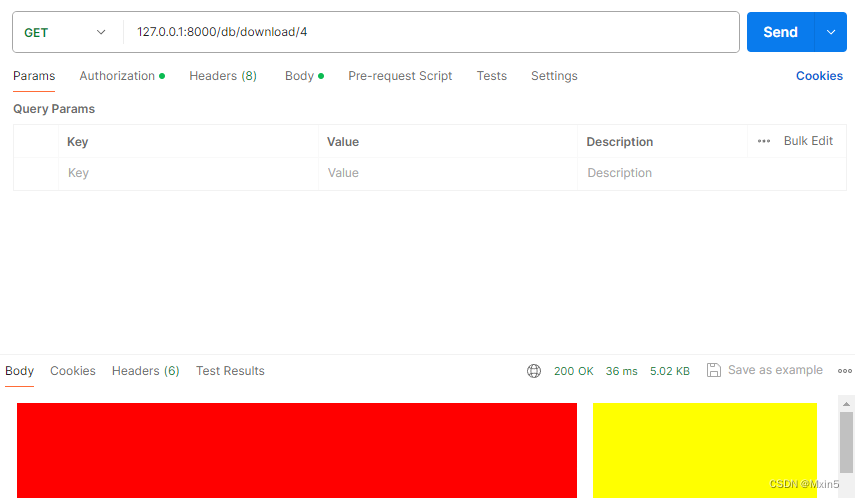
测试结果:

上传至Minio
首先要在本地或者服务器上部署minio并启动才可以进行文件的上传和下载,还未安装minio的可以参考一下这篇文章:【Docker】手把手教你在windows使用Docker安装Minio[详细教程]_minio windows-CSDN博客
一、代码层级结构
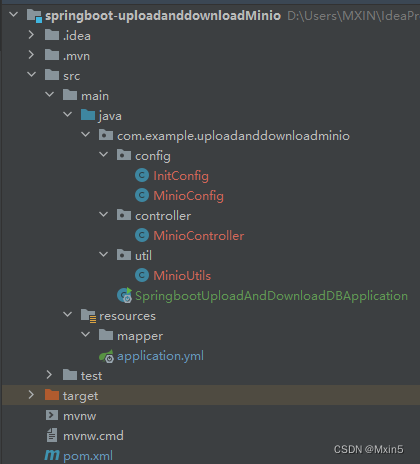
二、文件上传/下载接口
/**
* 文件上传、下载、删除、获取文件信息、获取文件url接口
* */
@Slf4j
@RestController
@RequestMapping("/oss")
public class MinioController {
@Autowired
private MinioUtils minioUtils;
@Autowired
private MinioConfig minioConfig;
/**
* 文件上传
*
* @param file
*/
@PostMapping("/upload")
public String upload(@RequestParam("file") MultipartFile file) {
try {
//文件名
String fileName = file.getOriginalFilename();
String newFileName = System.currentTimeMillis() + "." + StringUtils.substringAfterLast(fileName, ".");
//类型
String contentType = file.getContentType();
minioUtils.uploadFile(minioConfig.getBucketName(), file, newFileName, contentType);
return "上传成功,文件名:" + newFileName;
} catch (Exception e) {
e.printStackTrace();
return "上传失败";
}
}
/**
* 删除
*
* @param fileName
*/
@DeleteMapping("/")
public void delete(@RequestParam("fileName") String fileName) {
minioUtils.removeFile(minioConfig.getBucketName(), fileName);
}
/**
* 获取文件信息
*
* @param fileName
* @return
*/
@GetMapping("/info")
public String getFileStatusInfo(@RequestParam("fileName") String fileName) {
return minioUtils.getFileStatusInfo(minioConfig.getBucketName(), fileName);
}
/**
* 获取文件外链
*
* @param fileName
* @return
*/
@GetMapping("/url")
public String getPresignedObjectUrl(@RequestParam("fileName") String fileName) {
return minioUtils.getPresignedObjectUrl(minioConfig.getBucketName(), fileName);
}
/**
* 文件下载
*
* @param fileName
* @param response
*/
@GetMapping("/download")
public void download(@RequestParam("fileName") String fileName, HttpServletResponse response) {
try {
InputStream fileInputStream = minioUtils.getObject(minioConfig.getBucketName(), fileName);
response.setHeader("Content-Disposition", "attachment;filename=" + fileName);
response.setContentType("application/force-download");
response.setCharacterEncoding("UTF-8");
IOUtils.copy(fileInputStream, response.getOutputStream());
} catch (Exception e) {
log.error("下载失败");
}
}
}
MinioUtils
@Slf4j
@Component
public class MinioUtils {
@Autowired
private MinioClient minioClient;
/**
* 启动SpringBoot容器的时候初始化Bucket
* 如果没有Bucket则创建
*
* @param bucketName
*/
public void createBucket(String bucketName) {
try {
if (!bucketExists(bucketName)) {
minioClient.makeBucket(MakeBucketArgs.builder().bucket(bucketName).build());
log.info("创建bucketName = {}完成!", bucketName);
return;
}
log.info("bucketName = {}已存在!策略为:{}", bucketName, getBucketPolicy(bucketName));
} catch (Exception e) {
log.error("创建bucketName = {}异常!e = {}", bucketName, e);
}
}
/**
* 判断Bucket是否存在,true:存在,false:不存在
*
* @param bucketName
* @return
*/
@SneakyThrows
public boolean bucketExists(String bucketName) {
return minioClient.bucketExists(BucketExistsArgs.builder().bucket(bucketName).build());
}
/**
* 获得Bucket的策略
*
* @param bucketName
* @return
*/
@SneakyThrows
public String getBucketPolicy(String bucketName) {
return minioClient.getBucketPolicy(GetBucketPolicyArgs.builder().bucket(bucketName).build());
}
/**
* 获得所有Bucket列表
*
* @return
*/
@SneakyThrows
public List<Bucket> getAllBuckets() {
return minioClient.listBuckets();
}
/**
* 根据bucketName获取其相关信息
*
* @param bucketName
* @return
*/
@SneakyThrows(Exception.class)
public Optional<Bucket> getBucket(String bucketName) {
return getAllBuckets().stream().filter(b -> b.name().equals(bucketName)).findFirst();
}
/**
* 根据bucketName删除Bucket,true:删除成功; false:删除失败,文件或已不存在
*
* @param bucketName
* @throws Exception
*/
@SneakyThrows(Exception.class)
public void removeBucket(String bucketName) {
minioClient.removeBucket(RemoveBucketArgs.builder().bucket(bucketName).build());
}
/**
* 判断文件是否存在
*
* @param bucketName
* @param objectName
* @return
*/
public boolean isObjectExist(String bucketName, String objectName) {
boolean exist = true;
try {
minioClient.statObject(StatObjectArgs.builder().bucket(bucketName).object(objectName).build());
} catch (Exception e) {
log.error("[Minio工具类]>>>> 判断文件是否存在, 异常:", e);
exist = false;
}
return exist;
}
/**
* 判断文件夹是否存在
*
* @param bucketName
* @param objectName
* @return
*/
public boolean isFolderExist(String bucketName, String objectName) {
boolean exist = false;
try {
Iterable<Result<Item>> results = minioClient.listObjects(ListObjectsArgs.builder().bucket(bucketName).prefix(objectName).recursive(false).build());
for (Result<Item> result : results) {
Item item = result.get();
if (item.isDir() && objectName.equals(item.objectName())) {
exist = true;
}
}
} catch (Exception e) {
log.error("[Minio工具类]>>>> 判断文件夹是否存在,异常:", e);
exist = false;
}
return exist;
}
/**
* 根据文件前置查询文件
*
* @param bucketName 存储桶
* @param prefix 前缀
* @param recursive 是否使用递归查询
* @return MinioItem 列表
*/
@SneakyThrows(Exception.class)
public List<Item> getAllObjectsByPrefix(String bucketName, String prefix, boolean recursive) {
List<Item> list = new ArrayList<>();
Iterable<Result<Item>> objectsIterator = minioClient.listObjects(ListObjectsArgs.builder().bucket(bucketName).prefix(prefix).recursive(recursive).build());
if (objectsIterator != null) {
for (Result<Item> o : objectsIterator) {
Item item = o.get();
list.add(item);
}
}
return list;
}
/**
* 获取文件流
*
* @param bucketName 存储桶
* @param objectName 文件名
* @return 二进制流
*/
@SneakyThrows(Exception.class)
public InputStream getObject(String bucketName, String objectName) {
return minioClient.getObject(GetObjectArgs.builder().bucket(bucketName).object(objectName).build());
}
/**
* 断点下载
*
* @param bucketName 存储桶
* @param objectName 文件名称
* @param offset 起始字节的位置
* @param length 要读取的长度
* @return 二进制流
*/
@SneakyThrows(Exception.class)
public InputStream getObject(String bucketName, String objectName, long offset, long length) {
return minioClient.getObject(GetObjectArgs.builder().bucket(bucketName).object(objectName).offset(offset).length(length).build());
}
/**
* 获取路径下文件列表
*
* @param bucketName 存储桶
* @param prefix 文件名称
* @param recursive 是否递归查找,false:模拟文件夹结构查找
* @return 二进制流
*/
public Iterable<Result<Item>> listObjects(String bucketName, String prefix, boolean recursive) {
return minioClient.listObjects(ListObjectsArgs.builder().bucket(bucketName).prefix(prefix).recursive(recursive).build());
}
/**
* 使用MultipartFile进行文件上传
*
* @param bucketName 存储桶
* @param file 文件名
* @param objectName 对象名
* @param contentType 类型
* @return
*/
@SneakyThrows(Exception.class)
public ObjectWriteResponse uploadFile(String bucketName, MultipartFile file, String objectName, String contentType) {
InputStream inputStream = file.getInputStream();
return minioClient.putObject(PutObjectArgs.builder().bucket(bucketName).object(objectName).contentType(contentType).stream(inputStream, inputStream.available(), -1).build());
}
/**
* 图片上传
*
* @param bucketName
* @param imageBase64
* @param imageName
* @return
*/
public ObjectWriteResponse uploadImage(String bucketName, String imageBase64, String imageName) {
if (!StringUtils.isEmpty(imageBase64)) {
InputStream in = base64ToInputStream(imageBase64);
String newName = System.currentTimeMillis() + "_" + imageName + ".jpg";
String year = String.valueOf(new Date().getYear());
String month = String.valueOf(new Date().getMonth());
return uploadFile(bucketName, year + "/" + month + "/" + newName, in);
}
return null;
}
public static InputStream base64ToInputStream(String base64) {
ByteArrayInputStream stream = null;
try {
byte[] bytes = Base64.getEncoder().encode(base64.trim().getBytes());
stream = new ByteArrayInputStream(bytes);
} catch (Exception e) {
e.printStackTrace();
}
return stream;
}
/**
* 上传本地文件
*
* @param bucketName 存储桶
* @param objectName 对象名称
* @param fileName 本地文件路径
* @return
*/
@SneakyThrows(Exception.class)
public ObjectWriteResponse uploadFile(String bucketName, String objectName, String fileName) {
return minioClient.uploadObject(UploadObjectArgs.builder().bucket(bucketName).object(objectName).filename(fileName).build());
}
/**
* 通过流上传文件
*
* @param bucketName 存储桶
* @param objectName 文件对象
* @param inputStream 文件流
* @return
*/
@SneakyThrows(Exception.class)
public ObjectWriteResponse uploadFile(String bucketName, String objectName, InputStream inputStream) {
return minioClient.putObject(PutObjectArgs.builder().bucket(bucketName).object(objectName).stream(inputStream, inputStream.available(), -1).build());
}
/**
* 创建文件夹或目录
*
* @param bucketName 存储桶
* @param objectName 目录路径
* @return
*/
@SneakyThrows(Exception.class)
public ObjectWriteResponse createDir(String bucketName, String objectName) {
return minioClient.putObject(PutObjectArgs.builder().bucket(bucketName).object(objectName).stream(new ByteArrayInputStream(new byte[]{}), 0, -1).build());
}
/**
* 获取文件信息, 如果抛出异常则说明文件不存在
*
* @param bucketName 存储桶
* @param objectName 文件名称
* @return
*/
@SneakyThrows(Exception.class)
public String getFileStatusInfo(String bucketName, String objectName) {
return minioClient.statObject(StatObjectArgs.builder().bucket(bucketName).object(objectName).build()).toString();
}
/**
* 拷贝文件
*
* @param bucketName 存储桶
* @param objectName 文件名
* @param srcBucketName 目标存储桶
* @param srcObjectName 目标文件名
*/
@SneakyThrows(Exception.class)
public ObjectWriteResponse copyFile(String bucketName, String objectName, String srcBucketName, String srcObjectName) {
return minioClient.copyObject(CopyObjectArgs.builder().source(CopySource.builder().bucket(bucketName).object(objectName).build()).bucket(srcBucketName).object(srcObjectName).build());
}
/**
* 删除文件
*
* @param bucketName 存储桶
* @param objectName 文件名称
*/
@SneakyThrows(Exception.class)
public void removeFile(String bucketName, String objectName) {
minioClient.removeObject(RemoveObjectArgs.builder().bucket(bucketName).object(objectName).build());
}
/**
* 批量删除文件
*
* @param bucketName 存储桶
* @param keys 需要删除的文件列表
* @return
*/
public void removeFiles(String bucketName, List<String> keys) {
List<DeleteObject> objects = new LinkedList<>();
keys.forEach(s -> {
objects.add(new DeleteObject(s));
try {
removeFile(bucketName, s);
} catch (Exception e) {
log.error("[Minio工具类]>>>> 批量删除文件,异常:", e);
}
});
}
/**
* 获取文件外链
*
* @param bucketName 存储桶
* @param objectName 文件名
* @param expires 过期时间 <=7 秒 (外链有效时间(单位:秒))
* @return url
*/
@SneakyThrows(Exception.class)
public String getPresignedObjectUrl(String bucketName, String objectName, Integer expires) {
GetPresignedObjectUrlArgs args = GetPresignedObjectUrlArgs.builder().expiry(expires).bucket(bucketName).object(objectName).build();
return minioClient.getPresignedObjectUrl(args);
}
/**
* 获得文件外链
*
* @param bucketName
* @param objectName
* @return url
*/
@SneakyThrows(Exception.class)
public String getPresignedObjectUrl(String bucketName, String objectName) {
GetPresignedObjectUrlArgs args = GetPresignedObjectUrlArgs.builder().bucket(bucketName).object(objectName).method(Method.GET).build();
return minioClient.getPresignedObjectUrl(args);
}
/**
* 将URLDecoder编码转成UTF8
*
* @param str
* @return
* @throws UnsupportedEncodingException
*/
public String getUtf8ByURLDecoder(String str) throws UnsupportedEncodingException {
String url = str.replaceAll("%(?![0-9a-fA-F]{2})", "%25");
return URLDecoder.decode(url, "UTF-8");
}
}
三、使用postman进行测试
文件上传到minio
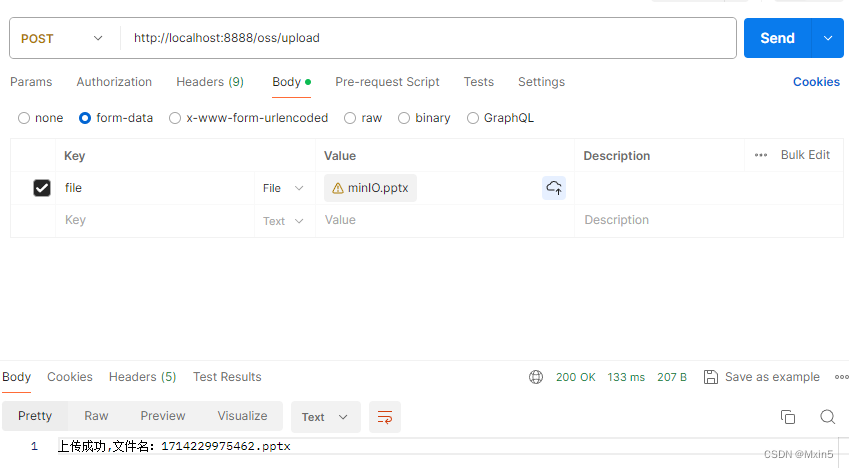
测试结果:

从minio中下载文件
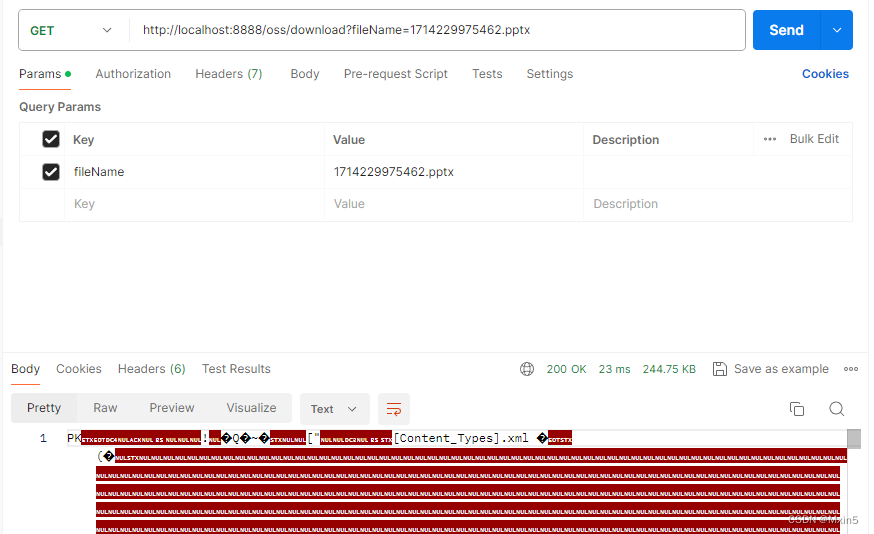

直接下载即可,这样就完成了从minio中下载指定文件,还有部分接口,如果感兴趣的小伙伴可以自行测试看下实际效果。
综上所有的代码就简单的介绍了一下Java实现文件上传和下载,希望能给你们实际开发带来一定的帮助,如果有出现问题的地方,希望指出,便于后续修改。
所有源码均以上传至https://download.csdn.net/download/m0_64210833/89233948
